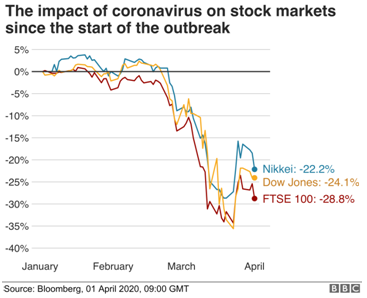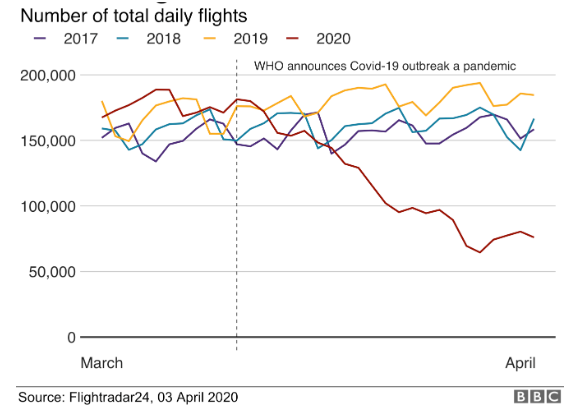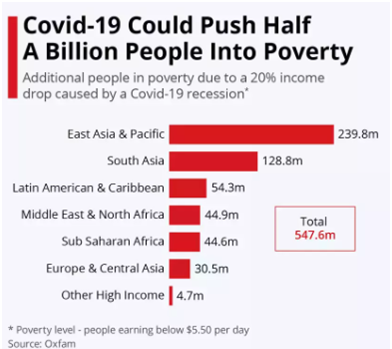18 Apr Economic impact of COVID-19
The coronavirus outbreak, which originated in China, has infected about two million people globally. It is a human tragedy that has not only cost the life of thousands of people but also affected many more with the impact on the health and the lives growing exponentially with every passing day. As this pandemic continues to expand across regions and countries, this article intends to provide inside on the evolving economic situation and its implications for the business organisations all over the world.
More than 178 countries and territories have now reported confirmed cases of COVID-19 that is a SARS-like virus. While some countries have managed to restrict the cases to a few hundred, most of the others that reported early community transmission have faced uncontrolled spreading of this virus to hundreds of thousands. The economies and government all over the world have launched unprecedented public-health and economic responses. Truth, as we are seeing it today, is way more frightening than fiction. It is evident that the human cost of COVID-19 pandemic is going to be unimaginably high but what is even worse is that it is going to have a long-lasting economic impact on the countries as well.
Wuhan that was the centre of this pandemic is already in the post-peak stage. According to the World Health Organisation, this is the stage where the level of the disease affecting the people begins to drop from the peak cases reported and the reason begins recovering. Wuhan in China is one of the largest global automobile hubs. Because of the early outbreaks of the pandemic, Wuhan was completely shut down for more than two months. Even though the Chinese industries are slowly moving towards normalcy, the curtailment of free trade will make the supply of the raw materials short. There is a possibility that the Chinese industries could make up to meet the post-pandemic demand by the other economies. But most of the regions that are still in the early stages of the pandemic are going to face soaring demand and weak supply of products and services in the markets.
Fill The Form – Get Assignment Help
The impact of the coronavirus can be easily identified from the global stock markets and their performance in recent weeks. The figure below indicates the decline in the global stock markets till April which is perceived to be the beginning of the covid-19 outbreak.
The industries all over the world are requesting for some serious government action for addressing this decline so that the economic growth of the countries is not completely destroyed. As a response to this, the central banks of most of the countries have decided to / their interest rates to make it cheaper for the people to borrow money and encourage them to spend more so that the economy can be revived. The United States of America that was the world’s largest economy has reported a huge number of people filing for unemployment with every passing day. The decision of the US Senate to pass a bill of $2 trillion as the coronavirus aid bill to help workers and businesses has resulted in some recovery of the markets. However, the economists and the business analysts have predicted that it is going to have little impact on the economy until the pandemic is contained and controlled.
The COVID-19 crisis has shaken global financial markets with heavy losses and intense volatility that has prompted investors to move around USD 90 billion out of emerging markets – the largest outflow ever recorded. The least developed countries of the world are expected to face a new debt crisis and there are calls for suspending debt payments from LDCs and other low-income countries; strengthening the global financial safety net and reversing the decline in official development assistance. As lockdowns and physical distancing have become the norm, digital communication tools have helped keep people connected. But many workers in the so-called “gig economy”, dominated by service sector start-ups, are poorly protected against income losses in a recession.
With more than one-third of the global population being put under restrictions of one kind or the other, it is clear that the world is staring at an economic recession. While economists may argue about the intensity of the slowdown ranging from being temporary to a long-term recession, they are unanimous about the fact that the slowdown would have a severe impact across various sectors of the economy. Foreign tourism and travel industry is clearly one of the worst-hit sectors and the ban on international flights has all but shut down this segment entirely.
The worst-hit sector due to the COVID-19 pandemic is the travel and tourism sector. The world Travel and Tourism Council have estimated that there will be cutting down of more than 50 million jobs globally in the travel and tourism industry alone. Currently, this industry contributes to 10% of the global GDP. Although the exact impact of the pandemic depends on how long it is going to last, the travel restrictions and additional scrutiny can further exacerbate this impact for this industry. Governments have warned against non-essential travel even after the lockdowns are removed and as many countries that have completely stopped the foreign arrivals altogether, this impact is only going to get worse. With most of the places in lockdown, the tourists had to cancel their holidays, while many others have been left stranded abroad. Because of the increased travel restrictions by countries all over the world, there is a significant decline in the number of flights taken every day. The chart below depicts the number of total daily flights for the last 3 years compared with the flights taken in the year 2020 from March to April beginning.
With the global increase in disposable incomes, an increasing number of people had been travelling abroad for leisure over the past years, resulting in the creation of a vast ecosystem of businesses that supported such travel. This year, all these businesses are going to have to fight just to survive. It is hard to imagine people travelling abroad for the next six months even after the lockdown due to the extremely fearful environment. Further, economic conditions are likely to leave less disposable income in the hands of the people and restrict spends to only essential purchases. Furthermore, even if the lockdown ends and the other business get back to normal, it is a possibility that foreign travel will remain restricted, leaving the industry crippled for several months, even while other sectors show signs of recovery. As the entire travel industry has been pushed to the verge of collapse, the governments must come out with a set of measures to aid and revive the sector.
Government intervention is desperately needed to alleviate the bloodbath that the economy will be seeing in the near future. While relief packages are being considered for the global tourism industry, it is critical that the governments also extend similar support to other industries and businesses that are equally impacted. Countries such as the USA, UK, Australia, UAE and Thailand have already come out with a set of directives to provide some relief to the economy.
The effects of the COVID-19 pandemic are mostly felt in the developed Nations till now. The final death toll and the resultant socio-economic impact of the virus can only be determined by how it is spreading and how it is controlled by the lower and the middle-income countries. The number of people pushed in poverty because of a drop in income resulting from the recession caused by the COVID-19 in the Global regions is depicted in the figure below.
The world has faced numerous grave economic crises before. However, economies collectively work to reduce the negative impacts of this outbreak, it is important to carry out careful planning and increase the collaboration in the short run. The pandemic has wrecked havoc on global production, supply chains, trade and tourism. The sharp reduction in international crude oil prices, if sustained, could improve the terms of trade for the economies, but the gain from this channel is not expected to offset the drag from the shutdown and loss of external demand.
A few months in, it is still hard to grasp the scale and scope of COVID-19’s global impact. A third of the world population is under some sort of “lockdown.” Over 200 countries are affected, and the number of new cases and deaths in many places is still growing exponentially. All the while, a second crisis, in the form of an economic recession, is underway. As stated by Liu Zhenmin, Under-Secretary-General for Economic and Social Affairs in the United Nations, “Only a collective response, inspired by shared responsibility and solidarity, will suffice to address the unprecedented challenges of the COVID-19 pandemic. The governments, development partners, the private sector and other stakeholders must work together to combat COVID-19 and support every effort to address its social and economic impacts.”





No Comments